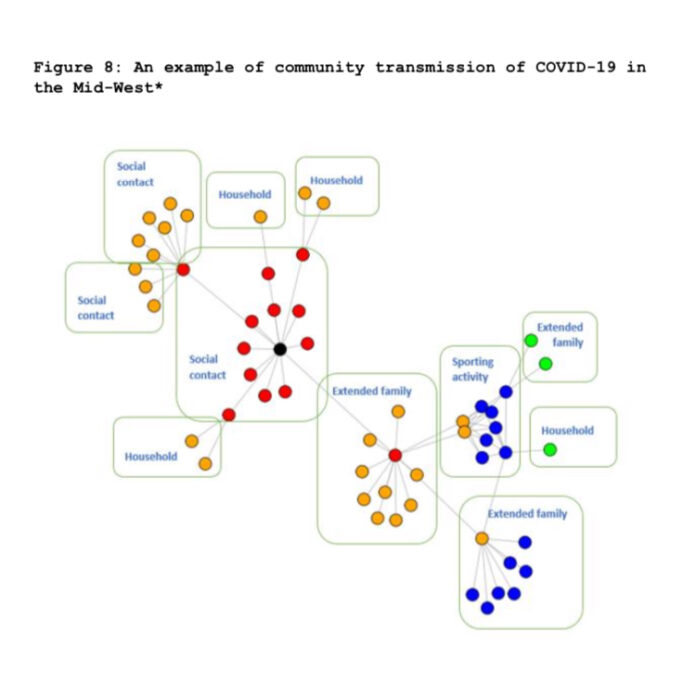
A man who failed to restrict his movements after returning to the mid west from an trip abroad, led to at least 56 people being infected with Coronavirus, including up to ten households, and a sports team.
The sobering “real example” of how covid-19 can quickly spread within the community was revealed Monday in a report published by the Department of Public Health, Mid West, which is located in Limerick, as the region surpassed its 3,000th case.
The man is not identified in the report.
“In total, 56 cases were infected from the index case, affecting up to 10 private households and a sports team,” the report stated.
The index case “was abroad on his holidays but he did not restrict his movements as per the current HSE guidelines when he got home”.
At first he had “mild symptoms including a runny nose and a mild sore throat”, and his “temperature was normal”.
“He felt reassured by this and socialised with a group of friends and he later tested positive for COVID-19 — However, by this stage, he had already infected a number of his friends; Three of these friends went on to infect their families.”
“Another friend who he infected felt unwell and contacted her GP to arrange a COVID-19 test. She had the test in the morning but by afternoon she felt a bit better and decided to go to a friend’s party.”
“After the party, she got her test result and it was positive. By attending the party while waiting for her test result, she ended up infecting a number of other people.”
As the index case “has a close extended family who visit each other’s houses regularly, this led to some extended family members also getting infected with COVID-19”.
“One of his extended family members who had no symptoms played a match with his local team and a number of his teammates were infected as a result”.
The team members then went on to infect “a number of people”.
There were 1,894 confirmed cases of COVID-19 in the region up to and including midnight 19 September, of which 293 had been hospitalised and one in five were healthcare workers.
That figure has jumped by over 11 hundred in the past four weeks.
Up to August 1st there were 93 deaths in the region, of which 80 were classed as “confirmed cases” and 13 were “probable or possible cases”.
The median age at death was 83 years; six (6.5%) of the cases who died were admitted to intensive care units; and the majority of cases (88.2%) who died had an underlying clinical condition.
Up to September 27th there were approximately 29,300 COVID-19 swabs processed in public hospitals run by the UL Hospitals Group, plus 700 in the private Bon Secours, Barringtons, as well as an undisclosed number at the National Virus Reference Laboratory.
The NVRL had processed nearly 605,000 swabs from all around the country for the same period.
Of the 1,894 confirmed cases by September 19th, 905 were in Limerick; 527 were in Clare, and 462 were in North Tipp.
NURSING HOMES / RESIDENTIAL CARE SETTINGS
The report also revealed that, following a decision by Nphet last April to carry out mass testing of nursing homes and residential care settings, swabbing for Covid-19 was carried out in the 57 residential care facilities across Limerick, Clare, and North Tipp.
The swabs were taken by the National Ambulance Service over a three-week period beginning 17th April 2020.
In total, 2,429 residents were tested and 117 residents tested positive for COVID-19.
Meanwhile, a total of 3,610 staff were tested and 78 tested positive for COVID-19.
“As a result of this mass swabbing, outbreaks were confirmed in five residential care facilities in the Mid-West
The report also highlighted “the significant underinvestment in an appropriate national IT case and outbreak management system for public health”.
It said the Department has “struggled in the absence of an appropriate IT infrastructure” and that, “to ensure that we can tackle COVID-19 in an effective, timely and efficient manner, processes, communication, staffing and ICT all need to be improved going forward”.
It noted the rapid development of a “CMP (Compact Management Programme) system, at a national level, to enable contact tracing of non-complex cases”.
“The development of this system was welcome and lessened the burden of contact tracing on local public health departments. As yet it has no capacity to assist in case investigation, outbreak identification or management, although this is planned.”
The report adds that “the use of multiple ICT systems to capture case/outbreak data creates an undue administrative burden within the department”.
The Department’s Mid West operation developed an OMS (Outbreak Management System) “to assist with contact tracing and identifying COVID-19 outbreaks” locally – a process it describes as “difficult to have to undergo in the middle of managing a pandemic”.
While the OMS “has been very useful for clinical staff within the department” it has also “been challenging from a data quality perspective”.
The OMS “does not interact with the national surveillance system CIDR (Computerised Infectious Disease Reporting System)”, and “continued IT support is needed to enable data linkage between systems”.
Meanwhile, the report added that an “ongoing development” of “robotic transfer of data from CMP to CIDR, as well as “robotic processing of results and creating of cases” was “a welcome addition”.









